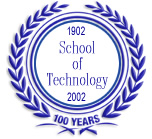
"Technology
and Us"
School of Technology
Centennial Symposium
An Extended Celebration

 |
"Technology
and Us" |
 |
|
|
Petroleum,
Technology and Us In the 1850s entrepreneurs had the idea of using kerosense, a distillation product of rock oil, as a low cost, cleaner burning illuminant for lamps. In 1859 the first well extracting large quantities of oil for processing into kerosene set off what can be accurately termed the oil age. In 1933, Harold Ickes, Franklin Roosevelt's Secretary of the Interior, made the following statement. "There is no doubt about our absolute and complete dependence on oil. We have passed from the Stone Age, to Bronze, to Iron, to the Industrial Age, and now to an 'age of oil'. Without oil, American civilization as we know it could not exist." It seems strange that a mere 74 years after the first discovery of large oil deposits, a distillation product being used for burning in lamps and the remainder discarded, could cause such a grand transformation. The discovery and use of kerosene was a technological success with positive effects for many people, and should not "be made light of". However the major technological innovations and societal ramifications could never have been imagined at the turn of the last century, or even in 1933 at the time of Ickes' remarks. By his time the need for an illuminant was not as great, as electrification projects mostly provided the artificial light previously obtained from the burning of kerosene. However an even greater need for a different petroleum distillation product came to the fore, with the advent of the internal combustion engine and the need for gasoline. Naphtha was originally discarded as a useless low boiling point distillation product of oil. During and after World War II, scientific and technological innovation turned naphtha into high octane fuel for relatively high compression internal combustion engines. At the same time technological innovations have resulted in other uses for direct distillation products of oil including their use as jet and diesel fuel, fuel oil for home heating, as well as asphalt for paving purposes. We are mostly familiar with the aforementioned applications. From a technological standpoint, the most stunning changes resulting from the application of petroleum products began in the early 1950s with the advent of the petrochemical industry. From crude oil two broad classes of compounds are obtained; olefins and aromatics. These are the precursors for so many products such as food packaging, nylons, polyesters, even pharmaceuticals. Almost anything organic, technically meaning carbon based as opposed to naturally occurring, is derived from oil. So many products which we associate with modern society are derived from petroleum, its' usefulness as a raw material extends well beyond that of simply deriving energy from it via combustion. Without further technological innovation, it is difficult to foresee how many of the conveniences which we take for granted as a result of materials derived from petroleum can be manufactured without it at reasonable cost. At this point the process of combustion to derive energy results in the irrevocable loss of this finite resource. The following chemical reaction for the combustion of the simplest of oil molecules, methane (CH4) or natural gas, is shown below. CH4 + 2O2 ' CO2 + 2H2O + energy Even
for the completely "clean" burning natural gas reaction shown,
carbon dioxide (CO2), a known greenhouse gas, is produced. There is no
doubt that the concentration of CO2 in the air has dramatically increased
since the combustion of fossil fuels, including oil, has become a common
practice. There is also little controversy remaining that this increased
concentration of CO2 in the air contributes to global warming. This and
other negative consequences of the technological revolution resulting
from the numerous applications of petroleum and its' derived products
cannot be ignored. Nor can we return to the iron, bronze or Stone Age,
we must learn to intelligently live with our technology. |